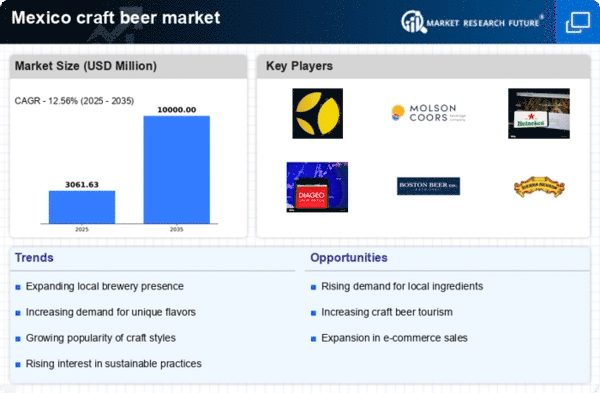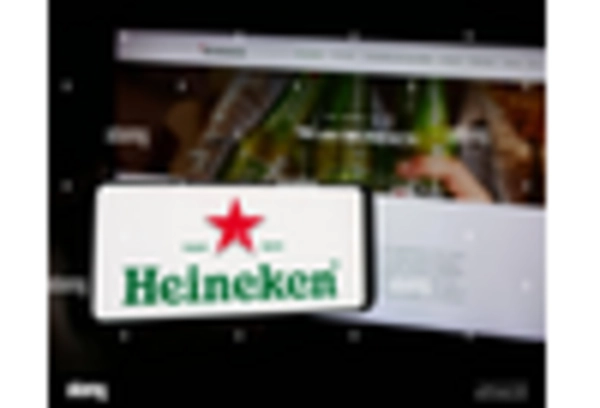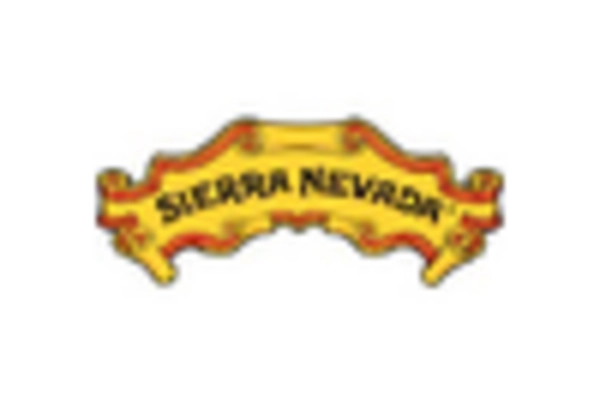Expansion of Distribution Channels
The craft beer market in Mexico is witnessing a significant transformation in its distribution channels, which is crucial for reaching a broader audience. Traditional retail outlets are increasingly complemented by innovative distribution methods, such as online sales and direct-to-consumer models. Recent statistics suggest that online sales of craft beer have grown by over 30% in the past year, indicating a shift in purchasing habits. This expansion allows smaller breweries to access markets that were previously dominated by larger brands. Furthermore, partnerships with local restaurants and bars are becoming more common, enhancing visibility and accessibility for craft beer products. As these distribution channels evolve, the craft beer market is likely to see an increase in market penetration, enabling consumers to discover and enjoy a wider variety of craft beers.
Health Consciousness and Craft Beer
The craft beer market in Mexico is increasingly influenced by rising health consciousness among consumers, which is reshaping preferences within the industry. As individuals become more aware of their dietary choices, there is a growing demand for craft beers that offer lower alcohol content and organic ingredients. Recent market analysis indicates that craft beers marketed as healthier alternatives have seen a sales increase of approximately 15% over the past year. This trend suggests that consumers are seeking beverages that align with their health goals while still providing a unique flavor experience. Breweries are responding by developing innovative products that cater to this demand, such as gluten-free and low-calorie options. As health consciousness continues to rise, the craft beer market is likely to adapt, creating opportunities for breweries to differentiate themselves in a competitive landscape.
Regulatory Support for Craft Breweries
The craft beer market in Mexico is benefiting from increasing regulatory support aimed at fostering the growth of local breweries. Recent legislative changes have streamlined the licensing process for small-scale brewers, making it easier for new entrants to join the market. This supportive regulatory environment is crucial, as it encourages entrepreneurship and innovation within the craft beer sector. Additionally, government initiatives aimed at promoting local products are likely to enhance the visibility of craft beers, further stimulating consumer interest. As more breweries emerge, the craft beer market is expected to diversify, offering a wider array of choices for consumers. This regulatory support not only aids in the establishment of new breweries but also strengthens the overall craft beer ecosystem, contributing to economic growth and job creation within the industry.
Increasing Consumer Demand for Craft Beers
The craft beer market in Mexico is experiencing a notable surge in consumer demand, driven by a growing preference for unique and locally produced beverages. Recent data indicates that the craft beer segment has expanded by approximately 20% in the last year alone. This trend reflects a shift in consumer behavior, as individuals increasingly seek out artisanal products that offer distinct flavors and brewing techniques. The craft beer market is benefiting from this heightened interest, as more consumers are willing to pay a premium for quality and authenticity. Additionally, the rise of social media platforms has facilitated the sharing of craft beer experiences, further fueling demand. As consumers become more educated about different beer styles and brewing processes, the craft beer market is likely to continue its upward trajectory, appealing to a diverse demographic that values craftsmanship and local sourcing.
Cultural Shift Towards Craft Beer Appreciation
In Mexico, there is a discernible cultural shift towards the appreciation of craft beer, which is reshaping the craft beer market. This shift is characterized by an increasing number of beer festivals, tasting events, and educational workshops that celebrate local breweries and their offerings. Recent surveys indicate that approximately 60% of consumers are now more inclined to explore craft beer options compared to traditional mass-produced alternatives. This cultural evolution is fostering a community of craft beer enthusiasts who value quality, flavor, and the stories behind each brew. As this appreciation deepens, it is likely to encourage further innovation within the craft beer market, as breweries respond to consumer preferences with new styles and flavors. The growing recognition of craft beer as a legitimate culinary experience is expected to enhance its status within the broader beverage landscape.
















